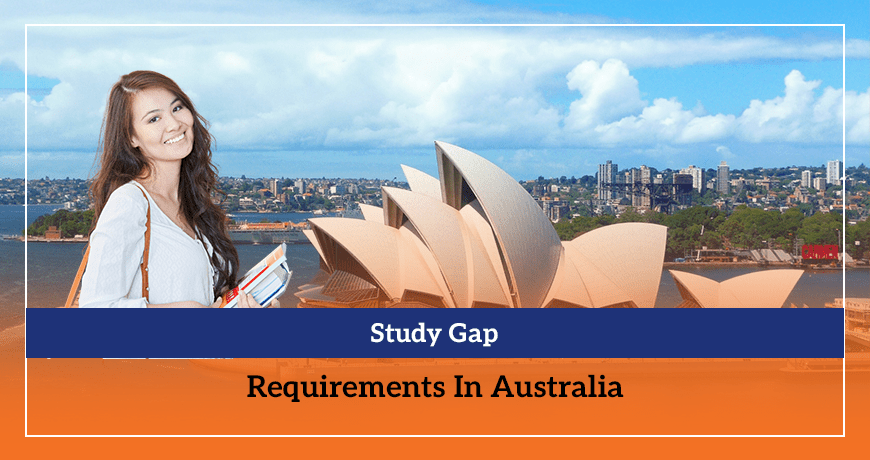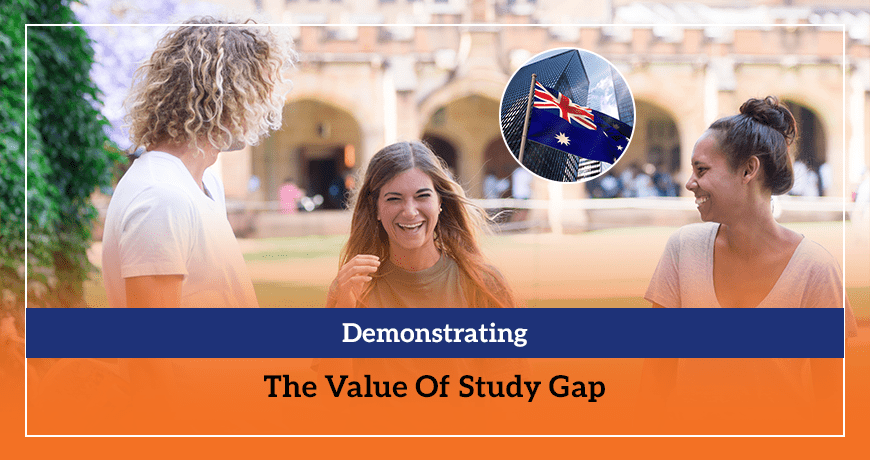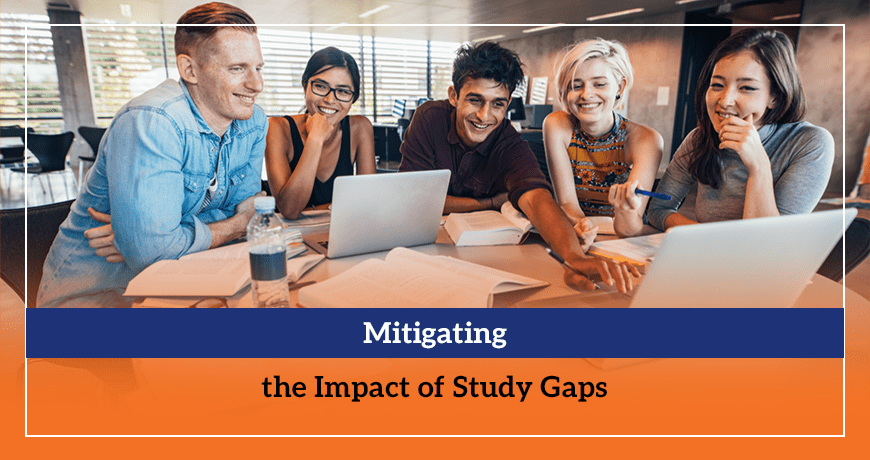Australia continues to shine as a preferred study destination for international students. Renowned for its world-class universities, safe and multicultural environment, and strong post-study work opportunities, it attracts thousands of students each year. In addition to offering a globally recognised education, Australia also provides excellent healthcare facilities, affordable transportation, and vibrant student-friendly cities like Sydney, Melbourne, Brisbane, and Perth.
For many students, pursuing higher education abroad does not always happen immediately after school or university. Life circumstances, financial challenges, work opportunities, or personal reasons often create study gaps. Suppose you are planning to study in Australia in 2026. In that case, it is crucial to understand how much gap is accepted for study in Australia, what counts as a valid justification, and how you can present your application convincingly to universities and visa authorities.
This comprehensive guide will cover:
- What is a study gap?
- The general acceptability of gaps in Australia (for undergraduate, postgraduate, and vocational courses).
- Visa regulations and documentation for 2026.
- Post-study visa pathways and changes.
- How to justify a gap effectively with evidence.
- Tips to strengthen your application despite a gap.
- Frequently asked questions by international students.
What Is a Study Gap?
A study gap refers to the period when a student takes time away from formal education before resuming further studies. This could range from a few months to several years. Universities and immigration authorities assess whether the gap was spent productively and if the student can still succeed academically.
Common reasons for study gaps:
- Health-related issues requiring rest or treatment.
- Family responsibilities, such as caring for relatives.
- Work experience or professional development in a related field.
- Financial challenges and the need to save money for education abroad.
- Skill development, such as language training or certification courses.
- Travel or volunteering that contributed to personal growth.
In Australia, a gap itself is not a problem; what matters is how you explain and justify it with evidence.
General Acceptance of Study Gaps in Australia
The acceptance of study gaps depends on the education level you are applying for. Australian universities and vocational institutes follow flexible yet structured policies:
|
Education Level
|
Typical Accepted Gap
|
Special Considerations
|
|
Undergraduate
|
1–2 years
|
Up to 3–4 years with strong justification (e.g., health, financial issues, employment).
|
|
Postgraduate
|
3–5 years
|
In some fields (like MBA, IT, healthcare), universities accept up to 10–12 years if supported by relevant work experience.
|
|
Vocational Training (TAFE/Diplomas)
|
1–2 years
|
Similar to undergraduate courses.
|
Key takeaway: If you can demonstrate that your gap added value to your personal, professional, or academic growth, Australian institutions are generally open to considering longer breaks.

Visa Requirements and Study Gap Considerations (2026)
International students must meet visa requirements under Student Visa Subclass 500. Acceptance of study gaps indirectly affects your visa approval chances, since the Department of Home Affairs requires you to prove you are a genuine student.
1. Student Visa Subclass 500 (2026 Regulations)
- Validity: Up to 5 years, depending on course length.
- Work Rights: 48 hours per fortnight during study terms; unlimited during scheduled breaks.
- Confirmation of Enrolment (CoE): Mandatory at application stage.
- Financial Requirement: AUD 29,710 (minimum living expenses for 12 months), plus tuition and travel costs.
- English Language Requirement: IELTS 6.0 overall (most courses); IELTS 6.5 required for Temporary Graduate Visa (Subclass 485).
- Onshore Restrictions: Certain visa holders (e.g., Visitor Visa, Temporary Graduate Visa) must now apply offshore.
2. Study Gap Acceptance
- Undergraduate: 1–2 years easily accepted; up to 3–4 years with strong evidence.
- Postgraduate: 3–5 years standard; 10–12 years accepted for fields where work experience is relevant (e.g., MBA, IT).
- Vocational Courses: Generally 1–2 years.
Supporting Documents Required:
- Medical certificates (for health gaps).
- Employment records (for professional gaps).
- Financial proof (if saving for education).
- Certificates for online courses, language training, or professional development.
- A well-crafted Statement of Purpose (SOP) linking the gap to your academic goals.
Post-Graduation Visa Pathways (2026 Updates)
Australia offers excellent post-study work opportunities, making it an attractive destination for international students with study gaps who seek long-term career options.
1. Temporary Graduate Visa (Subclass 485)
- Streams:
- Post-Higher Education Work Stream (Bachelor’s, Master’s, PhD).
- Post-Vocational Education Work Stream (Diplomas and trade qualifications).
- Age Limit: 35 years (exceptions for UK and Hong Kong passport holders).
- Stay Duration:
- Bachelor’s/Master’s – 2 years.
- PhD – 3 years.
- English Requirement: IELTS 6.5 overall, with 5.5 minimum in each band.
2. Training Visa (Subclass 407)
- For structured workplace training.
- Duration: 6–24 months.
- Requires employer sponsorship.
Tip: Even if you had a study gap, showing strong professional growth helps in qualifying for post-study visas.

Demonstrating the Value of a Study Gap
Instead of hiding your study break, turn it into a strength. Here’s how:
1. Highlight Personal and Professional Growth
- Mention any internships, jobs, or volunteer work.
- Showcase skill-building activities like coding bootcamps, language classes, or healthcare training.
2. Show Commitment to Academic Success
- Demonstrate how the gap prepared you mentally, financially, and professionally.
- A strong SOP outlining career goals can reassure admission officers.
3. Provide Solid Documentation
- Employment letters, medical records, or certificates from courses.
- Proof that you remained engaged in learning (online courses, seminars, research).

Mitigating the Impact of a Long Gap
Even a 5–7 year gap can be explained effectively if supported with:
- Strong academic record prior to the gap.
- Relevant work experience aligned with your chosen field of study.
- Recommendation letters from employers or academic supervisors.
- Certifications or training programs taken during the gap.
Universities and visa officers look for signs that you are still academically active and employable.
Additional Considerations for 2026 Applicants
- National Planning Level (NPL) Cap: Annual intake capped at 270,000 international students; priority for higher education and research.
- Priority Processing: Students applying to universities below their cap limits may get faster approvals.
- Work Rights: PhD and Masters by Research students can work beyond 48 hours/fortnight.
Pro tip: Apply early with all documents in place to avoid delays caused by caps and high demand.
 Frequently Asked Questions
Frequently Asked Questions
1. Is a study gap acceptable in Australia?
Yes, most universities accept gaps in academic records if they are justified with valid reasons and supporting documents.
2. How much gap is accepted for study in Australia after 12th?
Generally, 1–2 years is fine. Up to 3–4 years may be accepted with strong proof.
3. How much gap is accepted after graduation?
3–5 years is commonly accepted. MBA and IT programs may allow up to 10–12 years with relevant work experience.
4. Is a 5-year gap accepted in Australia?
Yes, if justified with work, health, or family reasons and backed by documents.
5. What about a 7-year gap in Australia?
It is harder to justify, but possible in exceptional cases such as long-term employment or health issues.
6. How can I cover my study gap for a student visa?
Provide a detailed SOP, attach medical or employment records, and explain how the gap aligns with your academic goals.
7. Does age matter when applying with a gap?
Yes. Applicants under 35 generally face fewer restrictions. For older students, professional experience is crucial.
8. Which universities accept gap years in Australia?
Institutions like RMIT University, Curtin University, Deakin University, and Griffith University are known for flexible policies regarding study gaps.
Conclusion
Planning to study abroad after a break in education is not unusual. In fact, Australian universities and visa authorities recognise that students may face personal, financial, or professional reasons for taking time off.
In 2026, most universities in Australia will accept:
- 1–2 years of gap for undergraduate courses (up to 3–4 years with justification).
- 3–5 years of gap for postgraduate courses (up to 10–12 years for programs like MBA or IT with professional experience).
By presenting valid documentation, drafting a compelling SOP, and highlighting how your gap contributed to your overall growth, you can successfully secure admission and a student visa in Australia.
Final tip: Stay transparent, prepare well, and use your gap as an opportunity to showcase resilience, adaptability, and commitment to your academic journey in the UK.